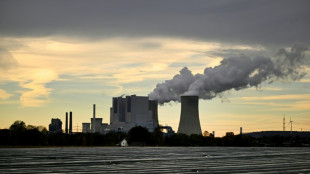
-
 'Extraordinary' trove of ancient species found in China quarry
'Extraordinary' trove of ancient species found in China quarry
-
Villa's Tielemans ruled out for up to 10 weeks

-
 Google unveils AI tool probing mysteries of human genome
Google unveils AI tool probing mysteries of human genome
-
UK proposes to let websites refuse Google AI search

-
 'I wanted to die': survivors recount Mozambique flood terror
'I wanted to die': survivors recount Mozambique flood terror
-
Trump issues fierce warning to Minneapolis mayor over immigration

-
 Anglican church's first female leader confirmed at London service
Anglican church's first female leader confirmed at London service
-
Germany cuts growth forecast as recovery slower than hoped

-
 Amazon to cut 16,000 jobs worldwide
Amazon to cut 16,000 jobs worldwide
-
One dead, five injured in clashes between Colombia football fans

-
 Dollar halts descent, gold keeps climbing before Fed update
Dollar halts descent, gold keeps climbing before Fed update
-
US YouTuber IShowSpeed gains Ghanaian nationality at end of Africa tour

-
 Sweden plans to ban mobile phones in schools
Sweden plans to ban mobile phones in schools
-
Turkey football club faces probe over braids clip backing Syrian Kurds

-
 Deutsche Bank offices searched in money laundering probe
Deutsche Bank offices searched in money laundering probe
-
US embassy angers Danish veterans by removing flags

-
 Netherlands 'insufficiently' protects Caribbean island from climate change: court
Netherlands 'insufficiently' protects Caribbean island from climate change: court
-
Fury confirms April comeback fight against Makhmudov

-
 Susan Sarandon to be honoured at Spain's top film awards
Susan Sarandon to be honoured at Spain's top film awards
-
Trump says 'time running out' as Iran rejects talks amid 'threats'

-
 Spain eyes full service on train tragedy line in 10 days
Spain eyes full service on train tragedy line in 10 days
-
Greenland dispute 'strategic wake-up call for all of Europe,' says Macron

-
 'Intimidation and coercion': Iran pressuring families of killed protesters
'Intimidation and coercion': Iran pressuring families of killed protesters
-
Europe urged to 'step up' on defence as Trump upends ties

-
 Sinner hails 'inspiration' Djokovic ahead of Australian Open blockbuster
Sinner hails 'inspiration' Djokovic ahead of Australian Open blockbuster
-
Dollar rebounds while gold climbs again before Fed update

-
 Aki a doubt for Ireland's Six Nations opener over disciplinary issue
Aki a doubt for Ireland's Six Nations opener over disciplinary issue
-
West Ham sign Fulham winger Traore

-
 Relentless Sinner sets up Australian Open blockbuster with Djokovic
Relentless Sinner sets up Australian Open blockbuster with Djokovic
-
Israel prepares to bury last Gaza hostage

-
 Iran rejects talks with US amid military 'threats'
Iran rejects talks with US amid military 'threats'
-
Heart attack ends iconic French prop Atonio's career

-
 SKorean chip giant SK hynix posts record operating profit for 2025
SKorean chip giant SK hynix posts record operating profit for 2025
-
Greenland's elite dogsled unit patrols desolate, icy Arctic

-
 Dutch tech giant ASML posts bumper profits, cuts jobs
Dutch tech giant ASML posts bumper profits, cuts jobs
-
Musetti rues 'really painful' retirement after schooling Djokovic

-
 Russian volcano puts on display in latest eruption
Russian volcano puts on display in latest eruption
-
Thailand uses contraceptive vaccine to limit wild elephant births

-
 Djokovic gets lucky to join Pegula, Rybakina in Melbourne semi-finals
Djokovic gets lucky to join Pegula, Rybakina in Melbourne semi-finals
-
Trump says to 'de-escalate' Minneapolis, as aide questions agents' 'protocol'

-
 'Extremely lucky' Djokovic into Melbourne semi-finals as Musetti retires
'Extremely lucky' Djokovic into Melbourne semi-finals as Musetti retires
-
'Animals in a zoo': Players back Gauff call for more privacy

-
 Starmer heads to China to defend 'pragmatic' partnership
Starmer heads to China to defend 'pragmatic' partnership
-
Uganda's Quidditch players with global dreams

-
 'Hard to survive': Kyiv's elderly shiver after Russian attacks on power and heat
'Hard to survive': Kyiv's elderly shiver after Russian attacks on power and heat
-
South Korea's ex-first lady jailed for 20 months for taking bribes

-
 Polish migrants return home to a changed country
Polish migrants return home to a changed country
-
Dutch tech giant ASML posts bumper profits, eyes bright AI future

-
 South Korea's ex-first lady jailed for 20 months for corruption
South Korea's ex-first lady jailed for 20 months for corruption
-
Minnesota congresswoman unbowed after attacked with liquid

| SCS | 0.12% | 16.14 | $ | |
| CMSC | -0.36% | 23.715 | $ | |
| CMSD | -0.19% | 24.05 | $ | |
| JRI | -5.27% | 12.995 | $ | |
| BCE | -0.08% | 25.499 | $ | |
| BCC | -1.08% | 80.87 | $ | |
| RIO | 0.17% | 93.07 | $ | |
| GSK | -1.48% | 50.06 | $ | |
| BTI | -0.92% | 59.79 | $ | |
| AZN | -2.42% | 93.34 | $ | |
| RBGPF | 0% | 82.4 | $ | |
| RYCEF | -2.69% | 16.7 | $ | |
| RELX | -2.53% | 37.415 | $ | |
| VOD | 0.45% | 14.565 | $ | |
| NGG | 0.51% | 84.74 | $ | |
| BP | 0.25% | 37.715 | $ |

Global sea ice cover hits record low in February as world continues hot streak
Global sea ice cover reached a historic low in February, Europe's climate monitor said Thursday, with temperatures spiking up to 11C above average near the North Pole as the world continued its persistent heat streak.
Copernicus Climate Change Service said last month was the third hottest February, with planet-heating greenhouse gas emissions stoking global temperatures.
That helped push combined Antarctic and Arctic sea ice cover -- ocean water that freezes and floats on the surface -- to a record minimum extent of 16.04 million square kilometres on February 7, Copernicus said.
"February 2025 continues the streak of record or near-record temperatures observed throughout the last two years," said Samantha Burgess of the European Centre for Medium-Range Weather Forecasts, which runs the Copernicus climate monitor.
"One of the consequences of a warmer world is melting sea ice, and the record or near-record low sea ice cover at both poles has pushed global sea ice cover to an all-time minimum."
Decreased ice cover has serious impacts over time on weather, people and ecosystems -- not just within the region, but globally.
When highly reflective snow and ice give way to dark blue ocean, the same amount of the sun's energy that was bounced back into space is absorbed by water instead, accelerating the pace of global warming.
Antarctic sea ice, which largely drives the global figure at this time of year, was 26 percent below average across February, Copernicus said.
It said the region may have hit its annual summer minimum towards the end of the month, adding that if confirmed in March this would be the second-lowest minimum in the satellite record.
The Arctic, where ice cover normally grows to an annual winter maximum in March, has seen record monthly lows since December, with February seeing ice cover eight percent below average for the month.
"The current record low global sea ice extent revealed by the Copernicus analysis is of serious concern as it reflects major changes in both the Arctic and Antarctic," said Simon Josey, Professor of Oceanography at the UK's National Oceanography Centre.
He added that warm ocean and atmospheric temperatures "may lead to an extensive failure of the ice to regrow" in the Antarctic during the southern hemisphere winter.
- Heat streak -
Globally, February was 1.59 degrees Celsius hotter than pre-industrial times, Copernicus said, adding that the December to February period was the second warmest on record.
While temperatures were below average last month over parts of North America, Eastern Europe and across large areas of eastern Asia, it was hotter than average over northern Chile and Argentina, western Australia and the southwestern United States and Mexico.
Temperatures were particularly elevated north of the Arctic Circle, Copernicus added, with average temperatures of 4C above the 1991–2020 average for the month, and one area near the North Pole hitting 11C above average.
Copernicus said a lack of historical data from polar regions makes it difficult to give precise warming estimates compared to the pre-industrial period.
Oceans, a vital climate regulator and carbon sink, store 90 percent of the excess heat trapped by humanity's release of greenhouse gases.
Sea surface temperatures have been exceptionally warm over 2023 and 2024, and Copernicus said readings in February were the second highest on record for the month.
Climate scientists had expected the exceptional heat spell across the world to subside after a warming El Nino event peaked in January 2024 and conditions gradually shifted to a cooling La Nina phase.
But the heat has lingered at record or near-record levels ever since, sparking debate among scientists.
A single year above the Paris Agreement limit of 1.5C warming from pre-industrial levels does not mark a breach of the climate deal, but with record-breaking temperatures last year scientists warn that target is rapidly slipping out of reach.
In the 20 months since mid-2023, only July of last year dipped below 1.5C, Copernicus said.
The EU monitor uses billions of measurements from satellites, ships, aircraft and weather stations to aid its climate calculations.
Its records go back to 1940, but other sources of climate data -- such as ice cores, tree rings and coral skeletons -- allow scientists to expand their conclusions using evidence from much further in the past.
Scientists say the current period is likely the warmest the Earth has been for the last 125,000 years.
F.Stadler--VB



